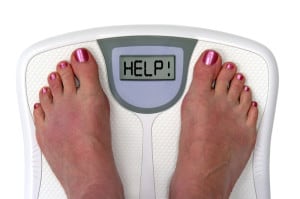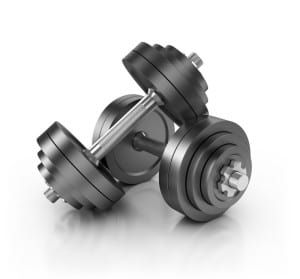Physical fitness can neither be achieved by wishful thinking nor outright purchase.
-Joseph Pilates

image: canstockphoto
If you’ve ever tried to lose a few pounds, you’ll know it can be a real challenge. Why is that? You’d think it would be simple: just eat less and exercise more, right? For a week or two, swap that daily Frappucino for an espresso and won’t the weight just drop off? And if that doesn’t work, there’s always this or that supplement/diet/fat-burning-ab-crunch/juice cleanse to kickstart the scales into action.
Except it’s not that simple.
The sad fact is, our bodies are hard-wired to store fat and conserve energy, making weight loss difficult. The “calories-in/calories-out” theory so many subscribed to for years has been proven flawed. This study shows that when it comes to fat loss, the type of food we eat has much more impact than the calories it contains. And recent research suggests that while all exercise is better than none, the intensity can matter more than the duration.
Restricting calories may result in weight loss, but if you can’t sustain the diet, the loss will be temporary.
All of these variables can be confusing for the person who just wants to figure out how to lose a few pounds.
Don’t get me wrong: I’m not suggesting you put down the dumbbells and retire to the couch. The risks of obesity and the benefits of exercise are pretty clear. What’s more, I know lots of people who’ve lost weight and kept it off. It can happen. So here are a few suggestions to try – and pitfalls to avoid – to help you do just that.
TRY adding strength training to your exercise routine.

image: canstockphoto
Muscle is more metabolically active than fat, which means it raises your metabolism, helping your body to burn more calories – even when at rest. But this is only one of the benefits of adding strength training to your workout. Resistance training can decrease the risk of osteoporosis, improve muscular strength and endurance, reduce blood pressure and improve balance, posture and stability. Ask a trainer to help you learn a workout that you can do 2-3x per week. Feeling strong is far more powerful than feeling skinny.
AVOID getting comfortable in your workout.

image: canstockphoto
One of the most common hindrances to weight loss is getting too comfortable in those long duration, steady-state workouts, such as walking or running on the treadmill at an unchanging intensity. Our bodies have an amazing ability to adapt to an exercise that’s repetitive or of long duration, so it becomes easier over time. Mix it up by changing your speed or incline, or try something new once in a while. If you’re a runner, try a spin class. If you do the same power yoga class every other day, go for a hike one day instead. The change or added intensity will prevent plateauing and motivation-killing boredom.
TRY getting more sleep.

image: canstockphoto
There’s a link between weight and sleep, too. Lack of sleep makes our bodies release hunger hormones, which leads to serious carb cravings. Indulge those impulses by noshing out on a doughnut and you’ll suffer a blood sugar crash soon afterward – making you feel even worse. And at the end of the day, even if you manage to drag yourself to the gym, your workout will likely be sub-par.
If possible, try to go to bed and wake up at the same time every day. If you have trouble sleeping, avoid overeating, caffeine or alcohol later in the day, and consider gentle yoga or meditation before bed.
AVOID any diet you can’t stay on safely forever.
As Charlotte Mackey explains in her new book, Smart People Don’t Diet, “Unfortunately, fast weight loss often results in fast weight gain. It’s unfair but true. Many scientists, doctors, nutritionists and psychologists understand that dieting often makes dieters gain weight rather than losing it, because nothing done for a few days or weeks can have a long term effect.”
Restricting calories may result in weight loss, but if you can’t sustain the diet, the loss will be temporary. Go on enough crash diets and you might risk messing up your metabolism permanently.
Instead, make small lifetime changes to your diet: Avoid added sugars, refined grains and processed foods. Eat in restaurants less often. Bring your lunch to work. If you cook, do it more often. If you don’t, learn to. Don’t eat late at night. And moderate your alcohol intake.
TRY eating a nutrient dense, high protein breakfast.

image: canstockphoto
A breakfast high in protein sets you up to eat healthfully for the rest of the day by creating a feeling of fullness and long lasting satiety. Add some good fats (like avocado or nuts) and slow burning carbs (like whole grains) and you might crave fewer treats during the day. Here are some ideas about how to add protein to your morning meal.
AVOID focusing on the scale.
The number on the scale only reflects the body’s weight, not what it is composed of. A pound of muscle takes up a lot less space than a pound of fat. I encourage my clients to avoid the scale and use a tape measure instead, checking key measurements like waist circumference. And even then, not too often.
Instead of exercising and eating healthfully just to lose weight, focus instead on all the other changes you may notice: the ability to breathe more easily, better sleeps and higher energy levels. These will also contribute to your sense of well being and confidence, boosting your resolve to stick with your lifestyle changes. Besides, it’s far healthier to be overweight and active than skinny and sedentary.
As my client Lara says, “I quickly learned the importance of a lifestyle change, the importance of proper form, and the happiness of becoming stronger rather than just losing weight.”
And Lara’s right. Being strong and fit means able to live life more fully, no matter what size you are.

0 Comments